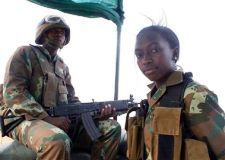South Africa to send more 100 peacekeepers to Sudan
November 7, 2007 (CAP TWON) — South Africa is to send an extra 100 peacekeepers to the strife-torn Darfur region of western Sudan, the government said Wednesday after talks between the heads of state from the two countries.
 “”We will have 800 troops in Sudan by the end of December,” Defence Minister Mosiuoa Lekota said after a joint press conference by South African President Thabo Mbeki and his Sudanese counterpart Omar al-Beshir in Cape Town.
“”We will have 800 troops in Sudan by the end of December,” Defence Minister Mosiuoa Lekota said after a joint press conference by South African President Thabo Mbeki and his Sudanese counterpart Omar al-Beshir in Cape Town.
South Africa currently has about 700 troops on duty in western Sudan, forming nearly 10 percent of an African Union force that has battled to keep the peace there and is due to be boosted by blue-helmet United Nations troops.
Mbeki said he might be willing to authorise even more troops, depending on forces available given South Africa’s current peacekeeping deployments in countries like Burundi and the Democratic of Congo.
“Yes we would look at that, bearing in mind our other commitments,” the president said when asked whether South Africa would contribute more forces to a hybrid African Union-United Nations force eventually meant to number around 26,000.
“We are looking at that because we are committed to making a contribution to the resolution of this matter. We are looking at what is required.”
Lekota later said South Africa would wait to see what was pledged towards the hybrid force by other African nations before considering which gaps it could fill.
The infantry requirement had already been oversubscribed and South Africa would likely have to provide more technical help, said Lekota.
He would not be drawn on whether South Africa would provide helicopters or other military hardware.
Beshir has been accused of dragging his heels over the deployment of the beefed-up force, which he finally agreed to in July.
He told journalists on Wednesday the UN was to blame for delays in the deployment.
“As soon as the resolution was passed concerning the hybrid operation, the United Nations Secretary-General was supposed to present a budget to the Security Council, but unfortunately up to now that has not happened,” he said through an interpreter.
He added all agreements required for the deployment were already in place.
“No new agreement is going to be signed.”
Beshir was speaking on the third and final day of a visit to South Africa, a non-permanent member of the UN Security Council.
Mbeki said Beshir shared a commitment to speedy deployment of the hybrid force and the resolution of the Darfur conflict between rebels and a pro-government militia.
He expressed disappointment that some Sudanese rebel groups recently boycotted peace talks in Libya.
“The international community really does need to push that, to make sure that everybody joins that process, because this is a critical element to the resolution of the conflict in Darfur. We need to bring in everybody.”
Mbeki urged the international community to meet pledges made towards the successful implementation of the 2005 Comprehensive Peace Agreement (CPA) that ended two decades of warring between Sudanese government forces in the north and rebels in the south.
The promised money was also meant to help rebuild war-torn southern Sudan.
“We have to go back to the people who made the pledges and ask them … why have you not kept your promises? It is very, very disappointing indeed what actually has flowed into Sudan.”
He thanked Beshir for a briefing on progress with the CPA, recently in danger of faltering when the former rebel Sudan People’s Liberation Movement quit the unity government in Khartoum.
“We were very pleased indeed that you brought us the good news that the government of Sudan and the government of the south and the SPLM have agreed on a programme of action over the next three months which would help to address all of these matters.”
The two men signed a host of co-operation agreements and committed themselves to strengthening bilateral ties.
(AFP)
